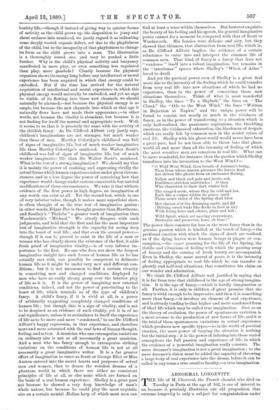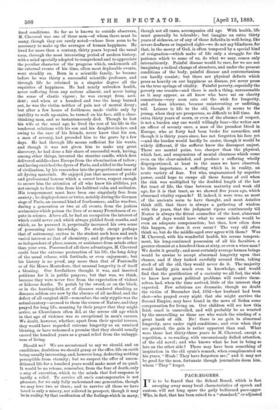ABNORMAL LONGEVITY.
THE life of M. Chevreul, the French chemist who died on 1 Tuesday in Paris at the age of 102, is one of interest to us, because it precisely illustrates our old proposition that extreme longevity is only a subject for congratulation under fixed conditions. So far as is known to outside observers, M. Chevreul was one of those men—of whom there must be many, though they are rarely noted—whose lives seem to be necessary to make up the averages of human happiness. He lived for more than a century, thirty years beyond the usual term, through the most interesting period of modern history, with a mind specially adapted to comprehend and to appreciate the peculiar character of the progress which, underneath all the external events of his time, often most deplorable events, went steadily on. Born in a scientific family, he became before he was thirty a successful scientific professor, and through life he retained in a singular degree all the requisites of happiness. He had nearly unbroken health, never suffering from any serious ailment, and never losing the sense of elastic vigour ; he was exempt from acci- dent ; and when at a hundred and two the lamp burned out, he was the victim neither of pain nor of mental decay ; but after a few hours of feebleness, made visible only by inability to walk up-stairs, he turned on his face, still a clear- thinking man, and so instantaneously died. Though he lost his wife at the usual age, he lived the rest of his life in the tenderest relations with his son and his daughter-in-law, and owing to the care of his friends, never knew that his son, a man of seventy, had preceded him to the grave by a few days. He had through life means sufficient for his wants, and though it was not given him to make any great discovery, he had done a fair share of successful work, having, among other things, invented the stearine candle, which first delivered middle-class Europe from the abomination of tallow ; and having enriched the dyers of Paris, and added to the beauty of civilisation, by his researches into the properties and uses of all dyeing materials. He enjoyed just that measure of public and professional honour which a savant loves, respect enough to secure him the attention of all who knew his abilities, yet not enough to force him from his habitual calm and seclusion. His temperament must have been one singularly free from anxiety ; he displayed once or twice, notably during the German siege of Paris, an unusual kind of fearlessness; and he was free, during a generation or two at all events, from the jealous acrimonies which poison the lives of so many Frenchmen of re- pute in science. Above all, he had an occupation the interest of which could never end, which always yielded fresh results, and which, as he pursued it, perpetually increased his own sense of possessing rare knowledge. No study, except perhaps that of astronomy, excites in the student such keen and such varied interest as that of chemistry; and perhaps no other is so independent of place, season, or assistance from minds other than your own. Possessed of all these advantages, M. Chevreul could bear the extreme protraction of his life, the long delay of the usual release, with fortitude, or even enjoyment; but his history is no proof, any more than that of Fontenelle or of Sir Moses Montefiore, that unusual longevity is of itself a blessing. Our forefathers thought it was, and inserted petitions for it in public prayers; but that was, we think, because they were never free from the expectation of violent or hideous deaths. To perish by the sword, or on the block, or in the hunting-field, or of diseases rendered shocking as diseases seldom are now by the absence of all medical, and the defect of all surgical skill—remember, the only styptic was the actual cautery—seemed to them the course of Nature, and they prayed for long life, meaning by their prayer that they might arrive, as Churchmen often did, at the serene old age which in that age of violence was so exceptional in men's careers. We doubt, however, whether, apart from their special terrors, they would have regarded extreme longevity as an unmixed blessing, or have welcomed a promise that they should usually exceed the hundred years as a grand relief from the unhappi- ness of living.
Should we? We are accustomed to say we should, and on conditions, doubtless we should grasp at the offer, life on earth being usually interesting, and, however long, deducting nothing perceptible from eternity; but we suspect the offer of uncon- ditioned life for a hundred years would make most of us quail. It would be no release, remember, from the fear of death, only a stay of execution, which to the minds that feel suspense is hardly a relief. To survive all one's contemporaries is not pleasant, for we only fully understand one generation, though we may love two or three ; and to survive all those we have loved is only a misery, not relieved in prospect, though it may be in reality, by that ossification of the feelings which in many,
though not all cases, accompanies old age. With health, life must generally be tolerable ; but imagine an extra thirty years of sickness, or of any of those defaults in well-being, like severe deafness or impaired sight—we do not say blindness, for that, in the mercy of God, is often tempered by a special kind of resignation—which make of life only a straggle for the patience which to some of us, do what we may, comes only intermittently. Painful disease would be rare, for we are not imagining a radical change of structure, and under the present conditions of the body, painful disease and centenarianism can hardly coexist; but there are physical defects which press as heavily on our happiness as disease, yet never press on the true springs of vitality. Painful poverty, especially the poverty one resents—and there is such a thing, unreasonable as it may appear, as all know who have sat on charity committees—very soon eats out the wish for longevity, and so does irksome, because uninteresting or unfitting, toil. Leisure is life to the old, though it seems to the young, when they are prosperous, so difficult to kill time. An extra thirty years of scorn, or even of the absence of respect, is not a burden any one would willingly bear—the writer saw an officer of seventy once, a man of the proudest blood in Europe, who at forty had been broke for cowardice, and though it is thirty years since, has not forgotten his face yet —and the burden would hardly be easier, though it would be widely different, if the sufferer knew the disrespect unjust. There are mental pains, too, sharper than the physical, which last, and suspensions of mental clearness which come even on the clear-minded, and produce a suffering wholly disproportioned, at least in the cases we have observed, to their importance, a suffering which is, in reality, an acute variety of fear. Yet who, unguaranteed by superior power, could hope to escape all these forms of evil when the risk was multiplied by the doubled length of the last flat tract of life, the time between maturity and weak old age, for it is that tract, as we showed five years ago, which abnormal vitality expands P If, indeed, it were true, as most of the ancients seem to have thought, and most Asiatics think still, that there is always a gathering of wisdom with the years, that the judgment ripens continuously till Nestor is always the fittest counsellor of the host, abnormal length of days would have what to some minds would be even an adequate compensation ; but then, how often does this happen, or does it ever occur P The very old often think so, but do the middle-aged ever agree with them P Was M. Chevreul, with his wonderful health, his serene tempera- ment, his long-continued possession of all his faculties, a greater chemist at a hundred than at sixty, or even a wiser man ? We doubt it greatly ; and most certainly average human beings would be unwise to accept abnormal longevity upon that chance, and if they looked carefully around them, taking stock of all the old, they would never do it. The majority would hardly gain much even in knowledge, and would find that the gratification of a curiosity we all feel, the wish to know how great political problems will resolve them- selves, had, when the time arrived, little of the interest they expected. Few solutions are dramatic, though no doubt the victim of December 2nd, 1852—her husband had been shot—who prayed every night that she might survive the Second Empire, may have found in the news of Sedan some compensation for living on. Our children will see how thin Irish snarl is unravelled, and will probably be as wearied by the unravelling as those are who watch the winding of a great hank of silk. No ! there is no gain in abnormal longevity, save under rigid conditions ; and even when they are granted, the gain is rather apparent than real. What were those last thirty-three years to M. Chevreul, except a repetition, a re-reading, with unconsciously dulled attention, of the old novel ; and who knows what he lost in being so late on the other side ? There may have been something of inspiration in the old cynic's remark, when complimented on his years, " Hush ! They have forgotten me ;" and it may not be good for the man, fortunate though journalists deem him, whom " They " forget.



































 Previous page
Previous page